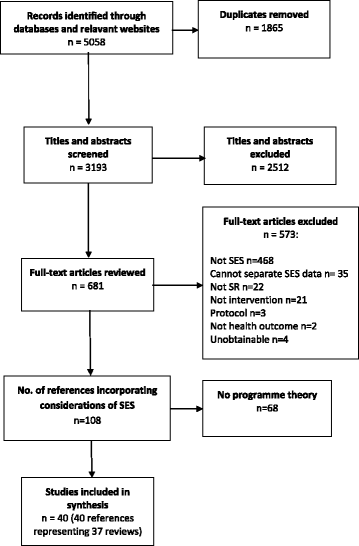Use of programme theory to understand the differential effects of interventions across socio-economic groups in systematic reviews-a systematic methodology review
- PMID: 29284538
- PMCID: PMC5747153
- DOI: 10.1186/s13643-017-0638-9
Use of programme theory to understand the differential effects of interventions across socio-economic groups in systematic reviews-a systematic methodology review
Abstract
Background: Systematic review guidance recommends the use of programme theory to inform considerations of if and how healthcare interventions may work differently across socio-economic status (SES) groups. This study aimed to address the lack of detail on how reviewers operationalise this in practice.
Methods: A methodological systematic review was undertaken to assess if, how and the extent to which systematic reviewers operationalise the guidance on the use of programme theory in considerations of socio-economic inequalities in health. Multiple databases were searched from January 2013 to May 2016. Studies were included if they were systematic reviews assessing the effectiveness of an intervention and included data on SES. Two reviewers independently screened all studies, undertook quality assessment and extracted data. A narrative approach to synthesis was adopted.
Results: A total of 37 systematic reviews were included, 10 of which were explicit in the use of terminology for 'programme theory'. Twenty-nine studies used programme theory to inform both their a priori assumptions and explain their review findings. Of these, 22 incorporated considerations of both what and how interventions do/do not work in SES groups to both predict and explain their review findings. Thirteen studies acknowledged 24 unique theoretical references to support their assumptions of what or how interventions may have different effects in SES groups. Most reviewers used supplementary evidence to support their considerations of differential effectiveness. The majority of authors outlined a programme theory in the "Introduction" and "Discussion" sections of the review to inform their assumptions or provide explanations of what or how interventions may result in differential effects within or across SES groups. About a third of reviews used programme theory to inform the review analysis and/or synthesis. Few authors used programme theory to inform their inclusion criteria, data extraction or quality assessment. Twenty-one studies tested their a priori programme theory.
Conclusions: The use of programme theory to inform considerations of if, what and how interventions lead to differential effects on health in different SES groups in the systematic review process is not yet widely adopted, is used implicitly, is often fragmented and is not implemented in a systematic way.
Keywords: Equity; Methodology; Programme theory; Systematic review; Theory.
Conflict of interest statement
Ethics approval and consent to participate
Not applicable.
Disclaimer
The views expressed are those of the author(s) and not necessarily those of the NHS, the NIHR or the Department of Health.
Competing interests
AB is an editor for the Systematic Reviews journal.
Publisher’s Note
Springer Nature remains neutral with regard to jurisdictional claims in published maps and institutional affiliations.
References
-
- Tripney J, Roulstone A, Hogrebe N, Vigurs C, Schmidt E, Stewart R. Interventions to improve the labour market situation of adults with physical and/or sensory disabilities in low- and middle-income countries: a systematic review. 2015.
-
- Ueffing ETP, Welch V, Petticrew M, Kristjansson E, for the Campbell and Cochrane Equity Methods Group . Equity checklist for systematic review authors. 2012.
Publication types
MeSH terms
LinkOut - more resources
Full Text Sources
Other Literature Sources


